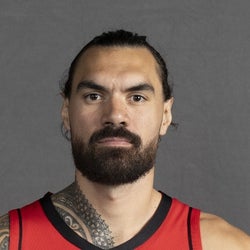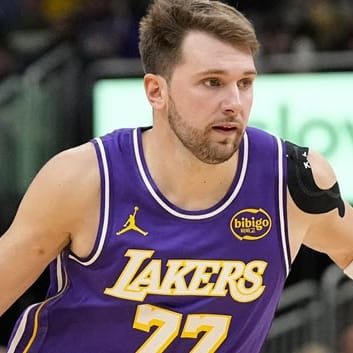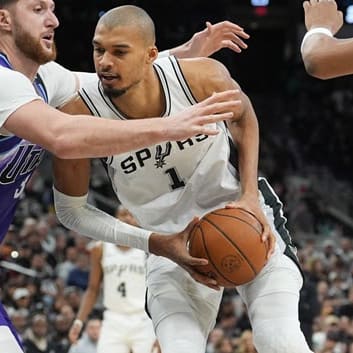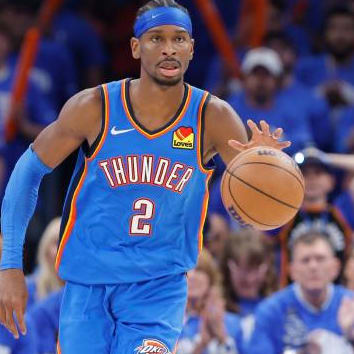OFS
Injury Ankle
Est. Return 10/1/2026
2025 Stats
PTS
5.8
REB
8.6
AST
1.5
STL
0.7
BLK
0.6
ROS Projections
2025 Fantasy Outlook
Ongoing maintenance, resulting from both injuries and age, limited Adams to just 57 games during his first season with the Rockets. Serving primarily as the backup behind Alperen Sengun, Adams closed the campaign with modest averages of 3.9 points and 5.7 rebounds in just 13.9 minutes per game. He continues to be one of the best per-minute rebounders in the league, with his efforts on the offensive glass a constant talking point. Despite his questionable production, Houston signed Adams to a new three-year deal during the offseason, highlighting just how important he is to what they are doing. However, Clint Capela was also signed to a three-year deal, complicating the situation regarding backup minutes. While Adams will likely play some sort of a role, it's hard to envisage him improving on what he did last season. Read Past Outlooks
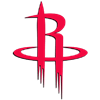
Undergoes season-ending surgery
The Rockets announced Wednesday that Adams has undergone season-ending left ankle surgery, per Shams Charania of ESPN.
ANALYSIS
Adams was already viewed as out indefinitely with a Grade 3 sprain, but he officially won't be able to return during the 2025-26 campaign. The veteran big man averaged 5.8 points, 8.6 rebounds and 1.5 assists in 22.8 minutes per contest through 32 games before going down, and he's under contract with Houston through the 2027-28 season. With Adams' year now over, Clint Capela and Dorian Finney-Smith are set to split the backup center duties behind Alperen Sengun.
Adams was already viewed as out indefinitely with a Grade 3 sprain, but he officially won't be able to return during the 2025-26 campaign. The veteran big man averaged 5.8 points, 8.6 rebounds and 1.5 assists in 22.8 minutes per contest through 32 games before going down, and he's under contract with Houston through the 2027-28 season. With Adams' year now over, Clint Capela and Dorian Finney-Smith are set to split the backup center duties behind Alperen Sengun.
NBA Per Game Stats
Per Game
Total
Per 36
NBA Per Game Stats
Loading Per Game Stats...
2025 NBA Game Log
2025
2024
2022
2021
2020
2019
2018
2017
2016
2025 NBA Per Game Split Stats
Schedule
By Month
Starting/Off Bench
Days Rest
Vs Opp
By Result
2025 NBA Per Game Split Stats
Loading Split Stats...
Advanced Stats
Loading Advanced Stats...
Stat Review
2025
2024
2022
2021
2020
2019
2018
2017
2016
How does Steven Adams compare to other players?
This section compares his stats with all players from the previous three seasons (minimum 200 minutes played)*. The bar represents the player's percentile rank. For example, if the bar is halfway across, then the player falls into the 50th percentile for that stat and it would be considered average.
True Shooting %
53.5%
Effective Field Goal %
50.4%
3-Point Attempt Rate
0.0%
Free Throw Rate
58.3%
Offensive Rebound %
22.2%
Defensive Rebound %
19.8%
Total Rebound %
21.0%
Assist %
8.3%
Steal %
1.3%
Block %
2.5%
Turnover %
13.4%
Usage %
12.0%
Fantasy Points Per Game
21.3
Fantasy Points Per Minute
0.9
NBA Historical Fantasy Stats
Historical ADP
Loading Historical ADP...
Rockets Depth Chart
Our full team depth charts are reserved for RotoWire subscribers.
Subscribe Now
Rockets Rotation: Minutes Breakdown
Loading Rockets Rotation Data...
Average Fantasy Points
Minutes
FanDuel
DraftKings
Yahoo
FantasyDraft
Head2Head
Sorare
Average Fantasy Points are determined when Steven Adams was active vs. non-active during the season. Click here to view average fantasy points for a different time period.
Loading Average Minutes...
Past Fantasy Outlooks
2024
2023
2022
2021
2020
2019
2018
2017
2016
2015
2014
2013
While out for the season due to knee surgery, Adams was traded to Houston during the 2023-24 campaign. He should be healthy coming into 2024-25, but his role on a young Rockets squad is unclear. Alperen Sengun is locked in as the starting center, a role he flourished in last season by putting up career-high numbers across the board. This would mean that, at best, Adams will serve as the primary backup, playing no more than 20 minutes off the bench. However, the Rockets also have Jock Landale, who doesn't have a high upside but has more appeal on the offensive end of the floor than Adams. During his last healthy season in Memphis, Adams finished outside the top 300 in nine-category leagues despite playing 27.0 minutes per game. Given his playing time will likely be significantly reduced, there is no reason to think he can be anything but an elite streaming option for anyone needing rebounds and efficient, yet low-volume scoring.
More Fantasy News

Out indefinitely with Grade 3 sprain
Rockets head coach Ime Udoka said Tuesday that Adams has been diagnosed with a Grade 3 left ankle sprain and will be out indefinitely, Vanessa Richardson of Space City Home Network reports.
ANALYSIS
Subscribe now to instantly reveal our take on this news.
Subscribe now to instantly reveal our take on this news.

Ruled out for Tuesday
Adams (ankle) won't play Tuesday against the Spurs.
ANALYSIS
Subscribe now to instantly reveal our take on this news.
Subscribe now to instantly reveal our take on this news.

Suffers ankle sprain Sunday
Rockets head coach Ime Udoka said after Sunday's 119-110 win over the Pelicans that Adams has been diagnosed with a sprained left ankle, Kelly Iko of Yahoo Sports reports. He posted five points (2-3 FG, 1-2 FT), 10 rebounds and two assists in 27 minutes prior to leaving the game.
ANALYSIS
Subscribe now to instantly reveal our take on this news.
Subscribe now to instantly reveal our take on this news.

Goes to locker room
Adams exited to the locker room in the fourth quarter of Sunday's game against the Pelicans due to an apparent left leg injury, Will Guillory of The Athletic reports.
ANALYSIS
Subscribe now to instantly reveal our take on this news.
Subscribe now to instantly reveal our take on this news.

Starting Sunday
Adams is starting Sunday's game against the Pelicans, Lachard Binkley of SI.com reports.
ANALYSIS
Subscribe now to instantly reveal our take on this news.
Subscribe now to instantly reveal our take on this news.
Latest Fantasy Rumors

Bigger role incoming
Adams is expected to take on a larger role in the absence of Alperen Sengun.
ANALYSIS
Sengun will be reevaluated at the end of this week and is expected to miss about 10-to-14 days with an ankle sprain. Adams drew the start Monday against the Suns and produced eight points, 11 rebounds, two assists and one steal in 31 minutes. Overall this season, Adams has 26 appearances to his name with averages of 6.0 points, 8.5 rebounds, 1.4 assists, 0.7 steals and 0.5 blocks.
Sengun will be reevaluated at the end of this week and is expected to miss about 10-to-14 days with an ankle sprain. Adams drew the start Monday against the Suns and produced eight points, 11 rebounds, two assists and one steal in 31 minutes. Overall this season, Adams has 26 appearances to his name with averages of 6.0 points, 8.5 rebounds, 1.4 assists, 0.7 steals and 0.5 blocks.


